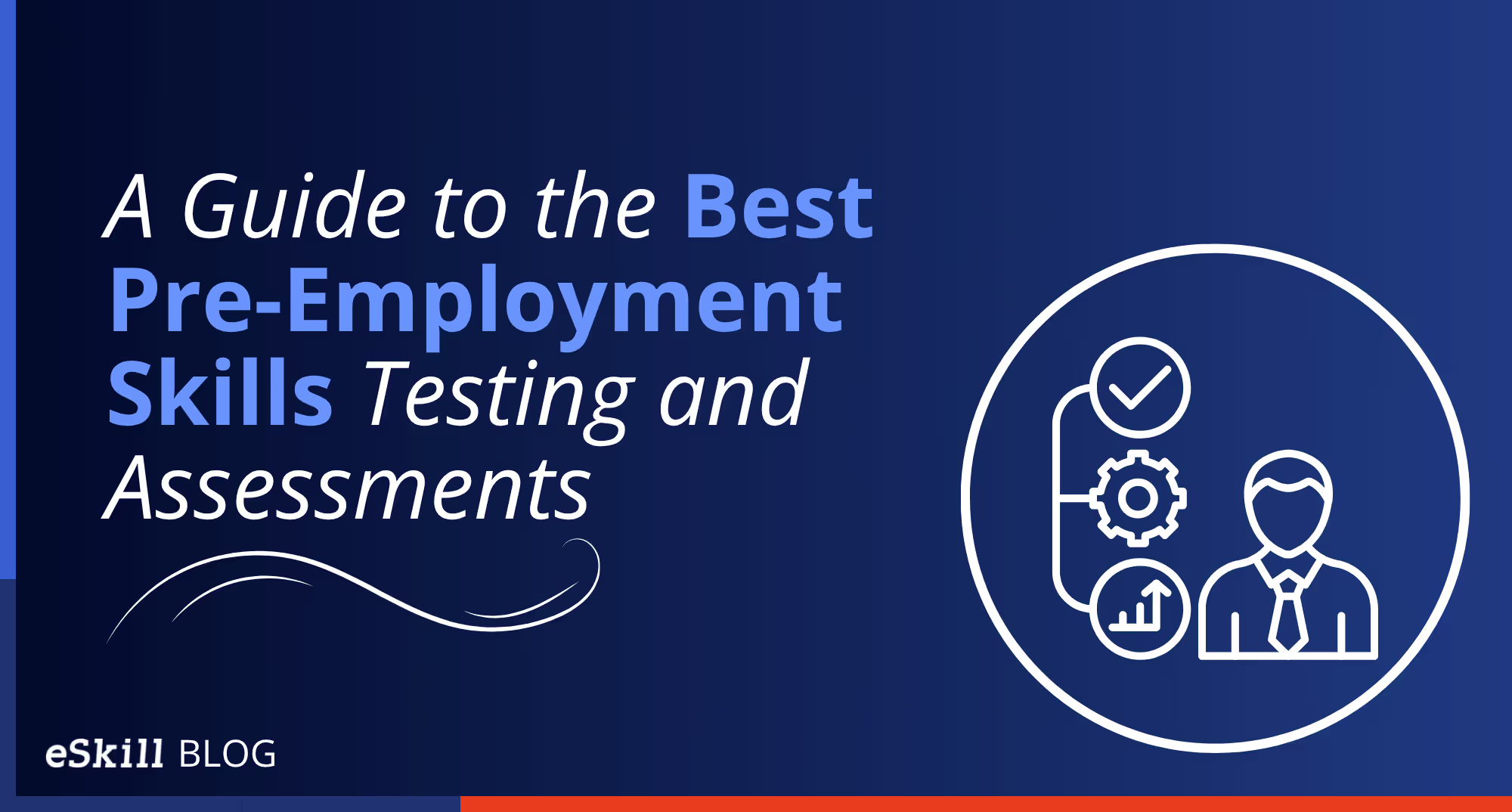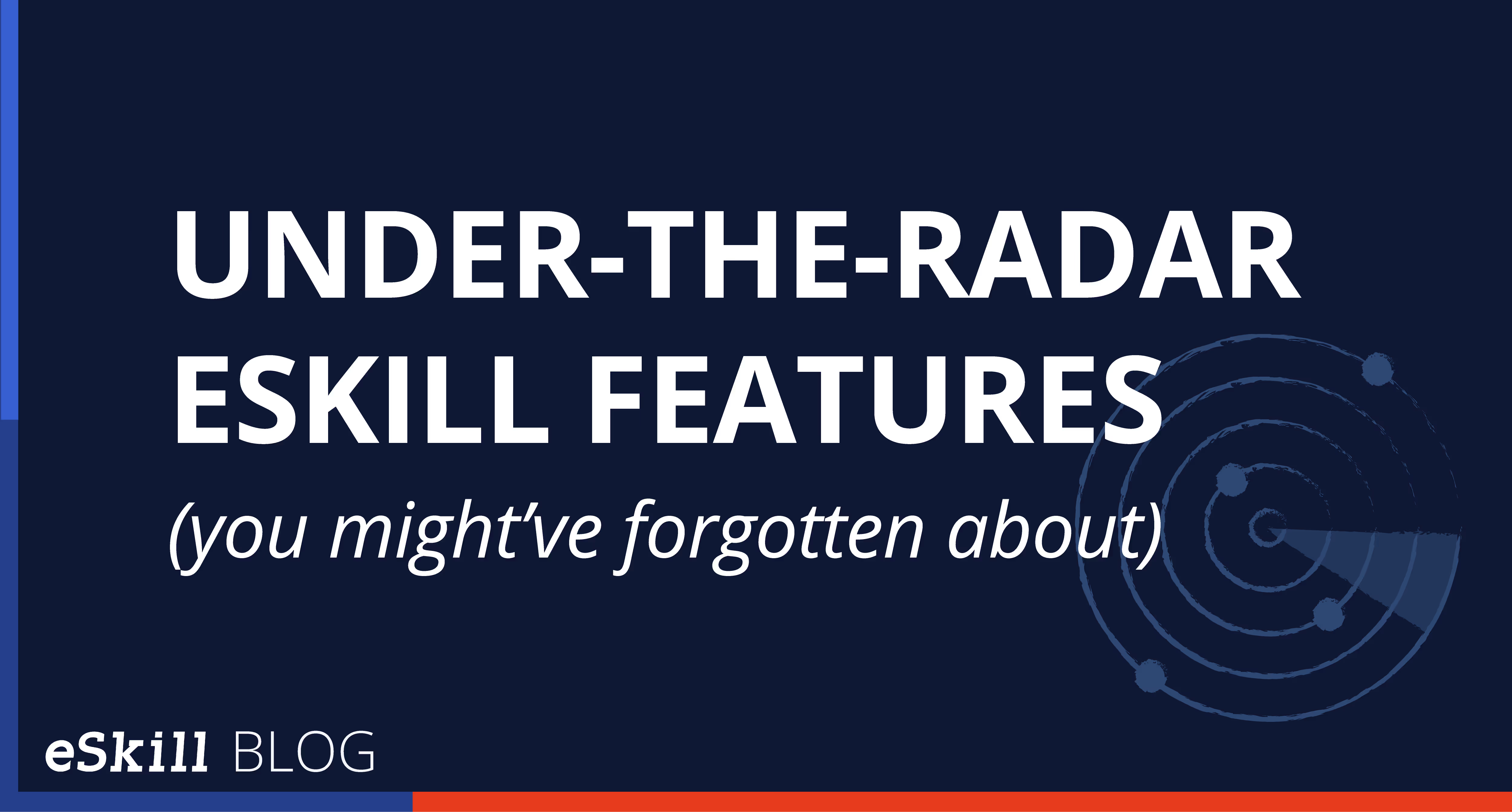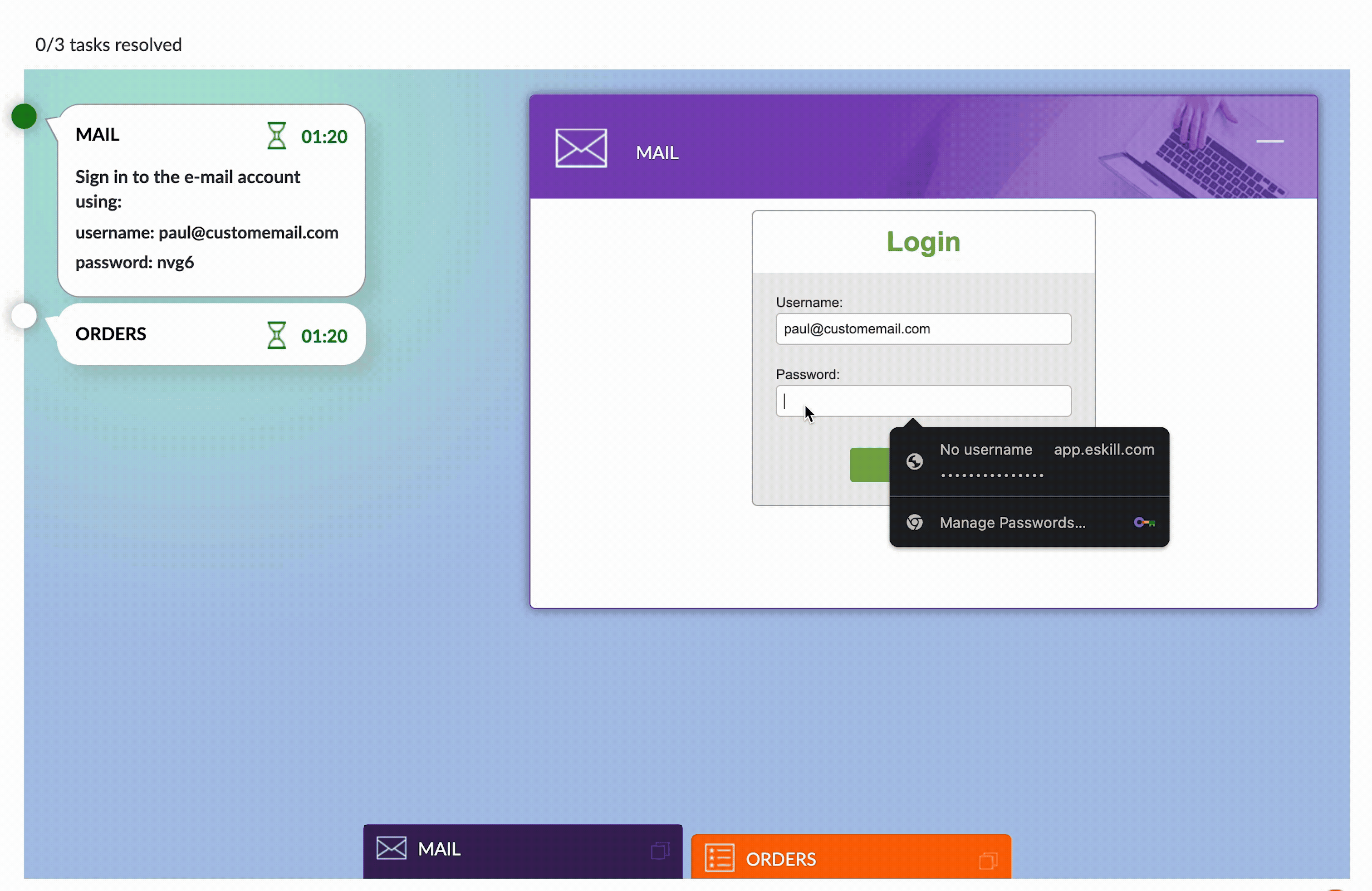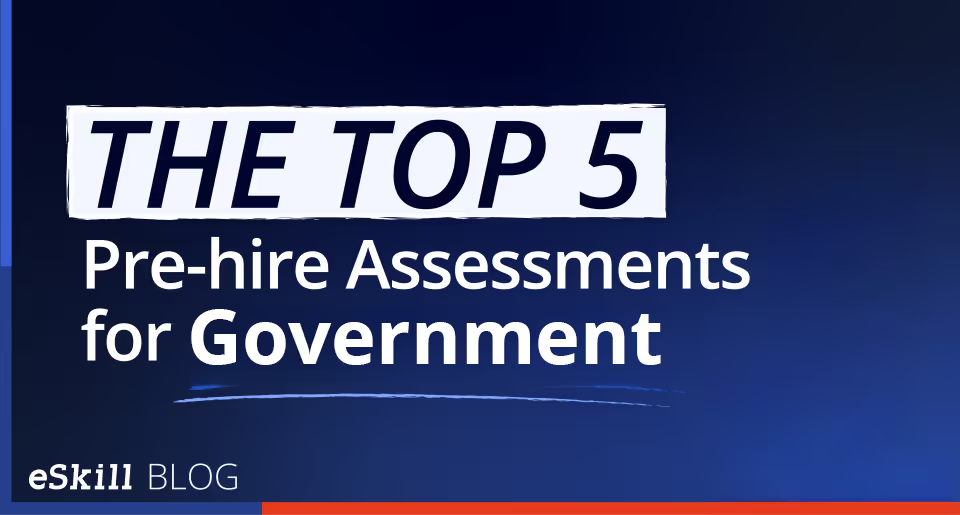Business leaders have learned that implementing a pre-employment skills testing program is the best way to improve the overall quality of hire. According to the Society for Human Resource Management (SHRM), 25% of employers that use pre-employment skills assessment tests plan to expand their use of them within the next five years, and one in 10 organizations that do not use a pre-employment skills testing solution plan to implement one within the next five years.
When HR professionals read about statistics like these, they are interested in learning more about pre-employment skills tests but have many questions. Two of the most common questions they ask are, “What is the basic skills test for employment?” and “What are the most commonly used tests for assessing employability?”
What is a Basic Skills Assessment Test
When HR leaders evaluate pre-employment skills testing solutions, they often feel overwhelmed because there are many types and choices. So, they frequently ask, “What is the basic skills test for employment?”
Hiring teams ask candidates to complete pre-employment skills assessments when they apply for a job so they can identify qualified candidates and eliminate unqualified applicants. These assessments include types of questions like multiple choice, true/false, and short answer. HR professionals also include simulations to evaluate how candidates perform in typical work situations.
What are the Two Most Common Types of Pre-Employment Tests?
The two most common types of pre-employment tests are skills tests and behavioral assessments. Most hiring managers use both to improve hiring outcomes and reduce the chances of expensive hiring mistakes.
Skills test results demonstrate which applicants have the knowledge and experience required to do a job. HR teams can instantly screen large volumes of candidates, identify the best-qualified candidates, and avoid wasting hours manually reviewing resumes.
Since business leaders know that teams with good “chemistry” are more productive, they use behavioral assessments to determine whether applicants are a good fit for a job and the corporate culture. According to the Society of Human Resources Management, organizations that use behavioral assessments can increase team performance by up to 30%.
Behavioral assessments evaluate a candidate’s personality and behavior and determine whether they will be successful in a job and assimilate well into the corporate culture. Behavioral assessments also offer valuable information on important soft skills such as integrity, work ethic, and grit, which are all important indicators of performance. They are not diagnostic like skills tests are. They simply show whether a potential new hire will be a good fit.
By reviewing behavioral assessment results, recruiters can see how applicants think and approach problems, how they communicate, and how they will perform in typical job situations.
What Are Some Commonly Used Skills Tests?
Pre-employment skills tests are used to evaluate a candidate’s knowledge and abilities for a given job. Businesses that implement an industry-leading solution like the eSkill Talent Assessment PlatformTM have access to an assessment library with hundreds of validated subject- and job-based skills tests.
HR teams can use standard pre-employment skills assessment tests as-is or customize them by designating question difficulty levels and eliminating irrelevant and inappropriate questions. These are some examples of popular skills tests in the eSkill Assessment Library.
- Accounting Clerk
- Office Manager
- Customer Service Supervisor
- Administrative Assistant
- Network Manager
- Maintenance Technician
- 911 Dispatcher
- Firefighter
- Data Entry Operator
- Medical Transcriptionist
- Paralegal
- Food and Beverage Manager
- Medical Records Clerk
Behavioral Assessments
Skills tests confirm which applicants have the skills required to do a job but do not show whether they are a good fit for your corporate culture. This means an applicant with a high score on a skills test could be a bad hire because their personality and work style clash with your company’s environment and how you get things done. This is where behavioral assessments come in.
Behavioral assessments show you whether a candidate can work effectively with peers, team members, and customers. By reviewing the results, you can see how a prospective new hire will interact with colleagues and subordinates and how well they will get along with customers. These are attributes behavioral assessments measure.
- Management and Work Style
- Teamwork and Collaboration
- Communication Style
- Ability to be a Team Player
- Motivation
- Values and Ethics
Benefits of Pre-Employment Skills Testing
Many organizations swear by pre-employment skills assessment tests because they maximize hiring outcomes and help their HR teams operate efficiently.
According to SHRM, 56% percent of employers say using pre-employment skills testing helps them evaluate job applicants’ skills, knowledge, and abilities, and 79% of HR professionals say skills test scores are just as important, if not more important, than traditional hiring tools like resumes and interviews.
When HR leaders are asked what they see as the biggest advantages of using pre-employment skills tests, these are some of the benefits they cite.
- Hire Top Employees: There is a worldwide shortage of candidates with in-demand skills. Pre-employment skills assessment tests help HR professionals recruit top talent by enabling them to easily verify which applicants have the required skills and experience.
- Eliminate Unqualified Applicants: The average recruiter needs six or seven seconds to screen a resume. That time can add up quickly if you receive thousands of resumes for a job posting. HR teams that use a pre-employment skills testing solution save hours because they can review results and instantly eliminate unqualified candidates. Skills testing also helps screen for inflated and untruthful resumes.
- Reduce Unconscious Bias: Pre-employment skills assessment tests minimize unconscious bias because hiring teams focus on candidates’ skills and abilities instead of making hiring decisions by relying on gut feel. According to SHRM, 23% of HR professionals said pre-employment skills testing has helped them improve diversity organization-wide.
- Take the Guesswork Out of Hiring: Traditional recruiting tools like resumes and interviews are not reliable because over 85% of candidates lie or embellish their experience on their resumes and during job interviews.
- Maximize Productivity: According to Harvard Business Review, top-performing companies are over 40% more productive than their peers and have operating margins that are 30% to 50% higher than competitors.
- Build High-Performing Teams: According to a McKinsey study, if an organization implemented a cross-functional project that would take three years to complete, the work would be completed in less than two years if they replaced 20% of the average performers on the team with top talent.
- Avoid Hiring Errors: A Gallup study shows that U.S. businesses lose $1 trillion yearly through voluntary turnover. The cost of replacing an employee can be as high as twice an employee’s annual salary,
- Minimize Turnover: Business leaders want to hire employees who will stay with their company and develop into productive team members. However, a shocking percentage of new hires leave within the first three months. Pre-employment skills assessment tests help you reduce turnover by helping you hire employees who are likely to stay with your organization.
- Provide a Better Candidate Experience: Once you attract the interest of promising candidates, you do not want them to become frustrated with your hiring process and decide to look elsewhere. By implementing a pre-employment skills testing solution, you can create an efficient hiring process that keeps candidates interested and engaged.
How Pre-Employment Skills Testing Improves Hiring Outcomes
You are probably wondering if implementing pre-employment skills assessment tests will have a major impact on hiring outcomes. The following scenario illustrates how using skills tests could have helped a company avoid a serious hiring mistake.
A regional financial services company with offices in 15 Western and Southwestern states needed to hire an administrative assistant to support several senior executives. Applicants submitted resumes, and the ones selected for an interview completed a typing test. However, candidates were not required to take a pre-employment skills assessment test to evaluate their ability to perform all job-related tasks.
When the HR team and executives evaluated candidates on the shortlist, Amalia stood out as the top candidate. Her typing test result showed she was fast and accurate, and her resume showed she had excellent phone and customer service skills and experience working with senior executives. The company extended her an offer, and she accepted. Then the problems began.
The managers at regional offices received weekly reports every Friday that provided important data they needed to develop and execute work for the following week. One of Amalia’s jobs was to compile the required information, summarize it on spreadsheets, and send the reports by courier on Thursday, so they arrived on Friday morning.
Amalia’s typing skills were good enough to complete the reports accurately, and she developed a good rapport with the executive she worked for and the managers at the regional offices. However, she was not good at multitasking and lacked the organizational and time management skills required to complete the reports and send them on time. This was an indication of another problem: inadequate Excel skills.
She missed the courier pickup deadline several times, and the managers received the reports late. When she was running late, she would rush and make critical mistakes. For example, one week, she sent the reports on time, but many went to the wrong addresses.
The next morning, several managers called the corporate office in a panic because they had not received their report, received the wrong report, or received their report as well as the report for another office.
Bridgit, the office manager, had to stop working on an important project, call each office to find out which managers were missing reports or received the wrong ones, make new copies, and send them priority overnight for Saturday delivery.
Organizational, time-management, and multi-tasking skills were essential for this job. If this company had used pre-employment skills assessment tests, it could have evaluated applicants’ skills in these areas. The results would have shown Amalia was not strong in these areas and she would not have been offered the job.
How Organizations Use Pre-Employment Skills Assessment Tests to Improve Hiring
Companies in every industry use pre-employment skills assessment tests to simplify hiring, reduce time-to-hire, and minimize turnover. The following are clients that have simplified recruiting by implementing the eSkill Talent Assessment PlatformTM.
- Charger Logistics, a commercial transportation company, reduced hiring costs by 30% and time-to-hire by 33% and increased employee retention to 95% when it began using customized pre-employment skills assessment tests.
- Chemonics, a global environmental solutions consultant, wanted to streamline hiring, decrease time-to-hire, and reduce turnover. The hiring process for some positions often took months. By implementing the eSkill Talent Assessment PlatformTM, the company reduced turnover by 43% and decreased time-to-hire to 55 days.
- Encore Exchange, a medical billing service, began using pre-employment skills tests and decreased applicant screening time by 67% and time-to-hire by 33%. The company also improved the quality of recruiting organization-wide.
- Regency Recruitment and Resources Limited, an HR solutions provider, was using a popular pre-employment skill testing solution. When it switched to the eSkill Talent Assessment Platform, it reduced recruiting costs by 50% while helping clients decrease time-to-hire.
- SolvOne, an environmental compliance company, requires new hires to complete training. Attrition was high because many candidates could not pass the course. The company implemented pre-employment skills tests to improve the quality of hire and increased graduation rates by 26%.
- TaskUs, is a global business outsourcing company that provides digital and customer services that help companies protect and grow their brands. Implementing pre-employment skills assessment tests helped it improve the quality of hire and reduce turnover by 25%.
Get Started with Pre-Employment Skills Assessment Tests
Pre-employment skills testing solutions like the eSkill Talent Assessment PlatformTM help organizations simplify and streamline recruiting, improve quality of hire, decrease time-to-hire, and reduce hiring costs. Many eSkill clients have decreased hiring costs by up to 70% and reduced time-to-hire by around 60%.
Do you want to learn how pre-employment skills assessment tests can help you improve hiring across your organization? Contact us to request a demo.
Talk to sales






